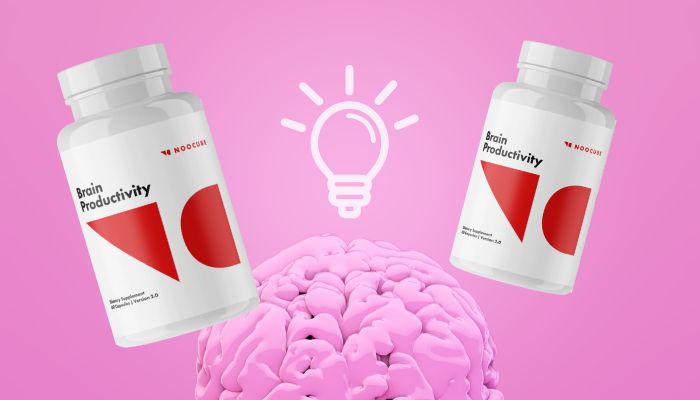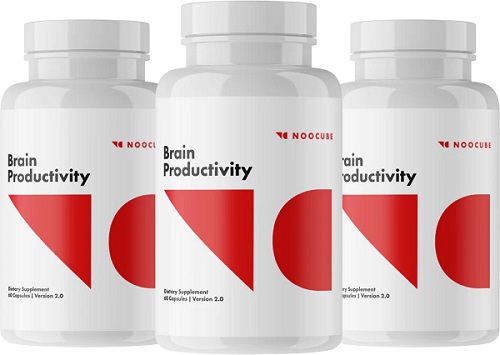Whether studying for an exam, college, or university assignment, you won’t score well without being fully focused on the task.
It’s normal to have trouble maintaining concentration at times, but it’s particularly frustrating when you’re studying for an important exam or qualification. It’s no surprise to learn that a 2010 study of 250,000 participants found that about 47% of our waking hours are spent thinking about anything other than the task at hand [1].
We’ve all been there – every time you try to focus on your study, your thoughts stray or you check your phone. In a world full of distractions, it’s little wonder our attention spans are shrinking [2].
Thankfully, there are supplements that are proven to help improve your focus, concentration, mood, and energy, giving you the ability to study better, for longer.
1. NooCube Nootropic
NooCube is a supplement made to improve your mental capacities, such as memory, focus, communication, and brainpower. You can perform better in any scenario or work thanks to the natural elements it contains, which help to enhance mental energy and boost mood.
This capsule supplement stands out from the competition by enhancing cognitive function without producing negative side effects, and clinical trials have validated the efficacy of its potent combination.
Cognitive functions are known to be improved by nootropics like NooCube. The issue is that the majority of nootropics available today are both pricey and inefficient. Does NooCube fall under this? We conducted the study and are now presenting our findings to you.
The supplement’s components increase the brain’s production of neurotransmitters like acetylcholine, glutamate, dopamine, and serotonin, which increases mental capacity and enhances focus, memory, and communication.
NooCube is a potent remedy for decreasing dementia-related illnesses since it prevents and heals brain damage and can stop the age-related breakdown process. Communication, memory, problem-solving, and other mental skills may be affected by dementia.
Keep in mind that this supplement can safely and naturally improve memory and reduce brain fog. NooCube, according to its website, has components that are necessary for a healthy and functional brain as well as the ability to support and boost mental speed, focus, and memory.
Lutein, along with the zeaxanthin isomers RR – and RS [meso]-, are three essential nutrients for the eyes and brain that can be found in the marigold plant-based supplement Lutemax®.
According to studies, Lutemax® can boost brain functions including memory, hearing comprehension, and visual acuity that are involved in information processing.
The 12 scientifically-backed ingredients in Noocube’s Brain Productivity were selected by some of Europe’s leading neuroscientists to boost brain regions associated with problem-solving abilities, reduced overwhelm, motivation, memory, and focus.
Better sleep, a more relaxed attitude during the day, and an overall elevated state of mind are but a few of the other advantages.
How to Improve Study Concentration and Focus Naturally

Of course, you’ll need more than just a good nootropic supplement to reap the benefits of better focus, and motivation. If you’re not sleeping and eating junk, don’t expect great brain-boosting supplements like NooCube to work.
There are a number of methods that have been shown to help with concentration, while some have more backing from scientific studies than others [3]. However, different approaches are more likely to prove fruitful for certain individuals.
If you’ve ever struggled to focus on something for an extended period of time, such as a difficult task at work, studying for an important exam, or working on a finicky project, you may have wished you could improve your concentration.
Focused mental effort on the task at hand, or on the subject being studied, is what we mean when we talk about concentration. The ability to focus on a single task for a prolonged period of time is known as “attention span,” which is often misunderstood.
Factors that negatively impact a student’s concentration could be one or a combination of things – Anxiety, depression, tiredness, ADHD, stress, and even hunger can all affect your ability to concentrate effectively.
There are numerous factors that can affect one’s ability to focus and maintain attention. It’s just more difficult for certain folks to block out background noise. The ability to focus might decline with age and sleep deprivation.
As we get older, our ability to focus and remember things tends to decline. Concentration can also be hindered by injuries to the brain or head, such as a concussion, or by mental health issues.
When you need to focus but can’t seem to do so, frustration is inevitable. This might cause anxiety and irritability, making it harder to concentrate on the task at hand.
If that describes you, read on for some tried-and-true strategies for focusing better. We’ll also discuss various conditions that can affect concentration and what to do if your own efforts to improve concentration don’t seem to be working.
Sleep and Focus

Many college students regularly devote their entire night to studying. Twenty per cent of students regularly pull all-nighters, while another 35 per cent regularly stay up beyond three in the morning. If you’re a parent of a teenager or young adult, this news si not shocking.
The worst thing a student can do for their marks is to stay up all night studying, even when taking nootropic supplements. Two MIT professors discovered this relationship between sleep deprivation and poor performance on exams back in October 2019.
The hippocampus is a brain area responsible for the short-term storage of newly acquired knowledge and information. Some researchers have proposed that the hippocampus, like other memory centres, has a finite amount of space available. Therefore, if the hippocampus is already at capacity, further learning will be impossible.
Critical thinking and the ability to come up with original solutions to problems are often measured by standardised examinations. Scientists have recently hypothesised that sleep, and specifically rapid eye movement (REM) sleep, has a role in enhancing these abilities.
In one study, researchers looked at how REM sleep affected people’s capacity to solve anagrams, which are word puzzles requiring a lot of creativity and problem-solving skills (for example, “EOUSM” for “MOUSE”). [4]
The easiest approach to retaining new study information is to think about it while sleeping. Because your daytime recollections get reinforced when you sleep. Connecting new information with old helps with retention as well. It’s possible that while you’re sleeping, original thoughts will come to you.
If you’re a student having trouble sleeping at a noisy university campus or college, try using earplugs and a sleep aid supplement.
Nutrition and Concentration
No doubt you’ve heard of “brain foods” – well, it’s true, good nutrition really will make or break your ability to concentrate.
Caffeine, for example, is not going to make you smarter, but it will give you energy and help you focus. Caffeine, a stimulant found in coffee, chocolate, energy drinks, and a few pharmaceuticals, provides a jolt of alertness but wears off quickly.
Caffeine is a stimulant, but too much of it can make you anxious and restless.
Considering skipping breakfast?
Breakfast eaters may have better short-term memory and focus, according to the research. Those who consume it are likely to outperform their peers in school.
High-fibre whole grains, dairy, and fruits are among the top foods recommended by scientists to feed the brain. Just don’t stuff yourself; studies show that heavy breakfasts might impair memory and focus.
Fish, which is abundant in the omega-3 fatty acids essential to brain health, is a protein source associated with a tremendous cognitive boost and is available in supplemental form.
The cognitive benefits of these healthy fats are astounding: They may play a crucial role in improving memory, especially as we age, and consuming a diet high in them has been associated with a reduced risk of dementia, stroke, and cognitive decline.
Vitamin E, an antioxidant found in many nuts and seeds, has been associated in some research with a slower rate of cognitive loss with age. A natural stimulant like caffeine is present in dark chocolate, which has additional potent antioxidant qualities and can help you focus.
You can receive all the benefits you need from eating up to an ounce of nuts and dark chocolate every day without consuming excessive amounts of calories, fat, or sugar.
Blueberries have been shown to help protect the brain from free radical damage and lessen the impacts of age-related illnesses like Alzheimer’s disease and dementia in animal studies. rodents of advanced age fed a diet high in blueberries showed cognitive improvements on par with those of considerably younger rodents.
It’s also worth noting that studies show regular physical exercise can reduce your chance of developing Alzheimer’s by 30% – a good reason not to skip PE class. When you combine nootropics with fitness, it makes for a potent brain-energising mix.
The B vitamin family, including B6, B12, and B9 (folic acid), contributes to mental well-being. However, a supplement is probably not necessary unless you’re deficient or pregnant (in which case, folic acid is essential to avoid birth defects). Talk to your doctor about your risk for Alzheimer’s disease.
The evidence for the effectiveness of vitamin B supplements in raising mental capacity is mixed. If you want to maintain your mental acuity, don’t stray from foods like leafy greens.
There is no shortage of health-improving vitamins on store shelves. Despite numerous encouraging studies demonstrating the brain-boosting effects of nutrients such as vitamins B, C, E, beta-carotene, and magnesium, supplementation is only beneficial for those whose diets are deficient in the nutrient being supplemented.
The effects of ginseng, ginkgo, and various combinations of vitamins, minerals, and herbs on the brain have been the subject of some cautious optimism among researchers.
The greens in your diet. Lutein, vitamin K, folate, and beta carotene found in leafy greens like kale, spinach, collards, and broccoli are beneficial to brain function. Recent studies have shown that diets high in certain plant items may protect against cognitive impairment.
Brain Energy Focus and Concentration
Any living thing’s most valuable mental asset is its attention. It defines the environmental factors we interact with, and most of the time, a variety of automatic, subconscious processes choose wisely which factors reach our conscious awareness. That’s because our concentration is determined by millions of neurons that are continually scanning their surroundings and picking out the most crucial details.
A recent UCL study measured cellular metabolism through brain imaging, suggesting that our brains have a maximum capacity for simultaneous processing.
Journal of Neuroscience research shows that paying attention alters the brain’s energy allocation, with more power going towards processing the things we pay attention to and less going towards those that aren’t.
Researchers from cognitive neuroscience and biomedical engineering used optical imaging to non-invasively assess brain metabolism. This would allow them to see changes in energy expenditure across brain areas as the cognitive load of activity increased.
Broadband near-infrared spectroscopy was used to determine the extent to which an enzyme in brain cells’ mitochondria, the powerhouses for all of a cell’s metabolic activities, was oxidised.
Using their method, the researchers measured brain metabolism in various regions of the visual cortex of 18 participants as they performed either complex or simple visual search tasks while also being occasionally presented with a visual distraction unrelated to the task at hand.
As the complexity of the task increased, they found an increase in cellular metabolism in brain regions sensitive to attended task stimuli, and a corresponding decrease in regions responding to unattended stimuli. This synchronous push-pull pattern indicates that available resources must be divided between focused and scattered operations.
Additional References:




